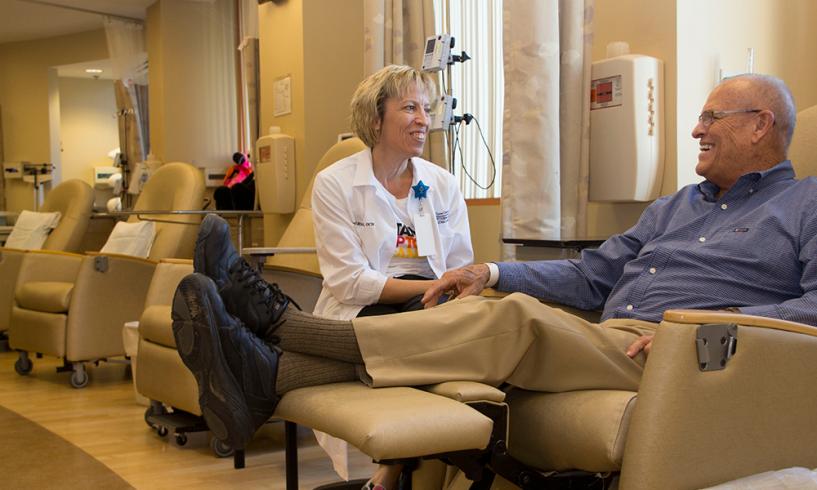As discussed in the March 2012 ONS Connect Up Front article, “Life After Cancer,” the American College of Surgeons’ Commission on Cancer standards will require all of its accredited facilities to have survivorship care plans (SCPs) in place by 2015. The plans must be given to patients at the completion of treatment and must include a record of care received, specific disease characteristics, and a written follow-up plan.
Key Definition
Survivorship care plan: Survivorship care plans (SCPs) have two components: a treatment summary that serves as a record and a care plan that acts as a guide. SCPs summarize the details of diagnosis and treatment and provide information on future issues such as follow-up care, long-term side effects, and resources for addressing potential psychosocial and practical issues.
What does this mean for oncology nurses? As the primary deliverer of patient education across the cancer continuum, nurses are in a key position to develop and implement those SCPs. In their article publishing in the June 2013 issue of the Clinical Journal of Oncology Nursing, Jackson, Scheid, and Rolnick discussed how the a project team at the Minnesota Cancer Alliance identified the needs of survivors after completion of treatment and developed an SCP that meets those needs.
Survivorship Care Plans
Jackson et al. explained that SCPs gained momentum after the release of the 2005 Institute of Medicine report, Cancer Patient to Cancer Survivor: Lost in Transition. That report recommended that all cancer survivors be given an SCP that includes, at a minimum,
- Information on the type of cancer treated
- Treatments received and their potential long-term side effects
- Recommended follow-up, preventive care, health maintenance, and well-being
- Information on legal protections, employment, access to health insurance, and psychosocial services in the community.
Several studies have documented the benefits of SCPs, including
- Facilitating the transition of patients from oncology to primary care and communication between those groups
- Addressing a lack of coordination of care, specifically who is in charge of which aspects
- Maintaining consistent and comprehensive information for patients who may have received fragmented care from multiple providers.
However, Jackson et al. said that the most valuable benefit is the ability to empower patients with information about their history and their future.
Table 1. User Feedback on the Minnesota Cancer Alliance SCP
| Feedback | N (%) |
| Help manage post-treatment health information | 89 |
| Easy to use | 78 |
| Improve understanding of post-treatment care | 74 |
| Improve communication with healthcare providers | 74 |
| Will continue to use the SCP to manage care | 74 |
| Help identify health concerns | 67 |
Before developing its own SCP, the Minnesota Cancer Alliance project team evaluated several other publicly available SCPs, including online tools such as the American Society for Clinical Oncologytreatment template for breast cancer, OncoLife Survivorship Care Plan, an SCP notebook from LIVESTRONG™, SCPs from local healthcare organizations, and those created by other states’ comprehensive cancer-control plans (e.g., Michigan, West Virginia). Many of the SCPs reviewed were too detailed or clinical, with language geared more toward healthcare providers than survivors. Others were too brief or simplified to convey meaningful information. In addition, the tools did not quite meet the unique needs of some Minnesotans—retirees who travel south in the winter, residents of rural areas, Native Americans, etc.—who often receive fragmented care in multiple settings.
Developing a Custom Survivorship Care Plan
The project team identified essential or guiding principles that, along with the results of a community needs assessment and recommendations from the Institute of Medicine SCP report, shaped the final SCP. Specifically, the tool needed to
- Support, empower, and inform cancer survivors.
- Help identify universal issues of cancer survivors, but also allow for personalization.
- Facilitate communication between oncology and primary care providers.
- Be able to be used by any health system across country.
- Not just duplicate medical charts.
- Help bridge the gap at post-treatment.
They chose to develop a patient-focused tool rather than one for providers to help reach a wide audience as possible. The SCP was able to be tailored to individual needs and could be used for survivors of any type of cancer. The tool could also be used with any healthcare system across the country.
The Minnesota Cancer Alliance tested the final SCP in 117 survivors from six organizations. Of those, 27 (25%) provided feedback (see Table 1). Of note, although the SCP was intended to be used when patients completed treatment, two-thirds of respondents thought it should be given to patients at diagnosis or the beginning of treatment.
The completed tool is available to download on Minnesota Cancer Alliance’s website.
For more information on SCPs, refer to the full article by Jackson et al. available soon on MetaPress.
The Journey Forward website also has survivorship resources for both healthcare providers and survivors.
- The Journey Forward Survivorship Care Plan Builder is for healthcare providers to create care plans to give to patients as they wrap up their cancer care.
- My Care Plan is for patients to use if they have not received a care plan from their provider.
Five-Minute In-Service is a monthly feature that offers readers a concise recap of full-length articles published in the Clinical Journal of Oncology Nursing (CJON) or Oncology Nursing Forum. This edition summarizes “Development of the Cancer Survivorship Care Plan: What’s Next? Life After Cancer Treatment,” by Jody M. Jackson, RN, BSN, Kathy Scheid, BS, RD, and Sharon J. Rolnick, PhD, MPH. Questions regarding the information presented in this Five-Minute In-Service should be directed to the CJON editor at CJONEditor@ons.org. Printing of this article for educational purposes and group discussion is permitted.






